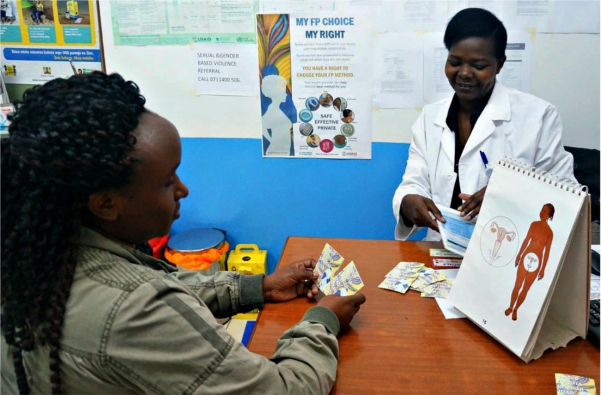Covert Contraceptive Use: A Prevalent yet Understudied Strategy used by Women to maintain their Reproductive Autonomy
Globally, over 214 million in low-income countries who want to delay or limit their pregnancies report not using and effective contraceptive method 1. This unmet need contributes to poor reproductive health outcomes for mother and child including high rates of maternal mortality 2. Male partner objection to or interference with contraceptive methods is one of the major barriers that women face to successfully using contraceptive methods, and is prevalent in sub-Saharan Africa 3-5. Reproductive coercion (RC) is the expression of this opposition, and refers to a specific set of behaviors to control women’s fertility and contraceptive use. These behaviors include using force or threats to pressure women to become pregnant against her will, and direct interference with women’s contraceptive use or ability to access contraceptive methods 7-10.
While recent research has focused on the prevalence of reproductive coercion and its connection to intimate partner violence (IPV), one area left relatively unexplored is how women respond to these controlling behaviors and attempt to maintain their reproductive autonomy.
Covert contraceptive use (CCU), the use of contraceptives without a male partner’s knowledge, is a strategy many women report utilizing when they do not want to become pregnant but are not able to openly use contraceptives due to RC and other coercion or restrictions form family of their community 11. One participant from a recent focus group in Nairobi, Kenya described why she used contraceptives covertly:
“When I gave birth to my first child, it was via a C-section. So when I told my husband that I needed time before having another child, he would take nothing of that kind, so I was forced to get the family planning method that I was using secretly.” – Family planning client, Kenya
Across the small number of studies assessing the prevalence of CCU, estimates range from approximately 25% to 35% among clinic and community-based samples of female contraceptive users 12-14>/sup>. CCU may be especially prominent in sub-Saharan Africa where acceptability of contraceptives is still low especially for unmarried adolescents, and nulliparous women. A recent study in Ghana among 300 women attending family planning clinics found that unmarried Muslim, and traditionalist women were significantly more likely to report CCU than their peers 12.
Preliminary results from a Center on Gender Equity (GEH) study among a representative sample of married adolescents and their husbands (n= 1100 dyads) in rural Niger are consistent with these findings. GEH has found that one in every three married adolescent contraceptive users reports that they have done so without their husband’s knowledge, with covert use particularly common among adolescents who had not had children 13. Supporting the hypothesis that women resort to CCU in contexts in which their partners attempt to restrict and interfere with their contraceptives with their husband’s knowledge to report experiencing reproductive coercion 13.
In Kenya, preliminary findings from another GEH study among contraceptive users at community-based clinics in urban Nairobi indicate that 1 in 4 women reported ever using contraception covertly 14. Findings from focus groups of women from these same clinics illustrate the strategies some women use contraception without their male partners knowing so as to maintain their reproductive autonomy. Here women described going to clinics when their partner was away, switching contraceptive methods to one that can be better concealed from their partner (i.e. injection, IUD, implant), and employing support networks of other women both access contraceptives and hide them outside their homes. Women described using methods covertly and successfully for several months to years 15.
“I am even the one who keeps the pills for [my friend] because she cannot keep the pills in her house, as she is not yet married. She is seeing men [sexually active], but she doesn’t want to get pregnant, so I have advised her to use pills and condoms.” – Family planning client, Kenya
Covert contraceptive use is a prevalent yet understudied phenomenon that represents an important form of women’s resistance to male partner opposition to and interference with pregnancy prevention, as well as promising strategy for modern contraceptives 16. Covert contraceptive use is a behavior that allows women to maintain autonomy regarding their reproductive health and decisions, even in the presence of barriers from partners, family or others attempting to control if and when they will become pregnant. Further study of CCU should be prioritized as one strategy to promote both gender equity and health.
GEH is currently developing and evaluating ARCHES (Addressing Reproductive Coercion in HEalth Settings), a model that provides education and empowerment to increase women’s reproductive autonomy, including support of CCU among women who are coping with reproductive coercion. Because women in different cultural and geographic contexts may employ different education on CCU strategies that women from their local communities report successfully using 17,18. Currently, ARCHES is being adapted for the Kenyan and Bangladeshi contexts by GEH’s Jay Silverman and local implementing partners. Results from evaluations of these adaptations of ARCHES will inform ongoing efforts to support clinical providers to promote reproductive autonomy for women, including use of CCU.
Authored by: Jasmine Uysal, MPH
References:
- Guttmacher. Adding it up: Investing in Contraception and Maternal and Newborn Health, 2017. Guttmacher Institute 2017.
- Saiffuddin Ahmen QL, Li Liu, Amy Tsui. Maternal deaths averted by contraceptive use: an analysis of 172 countries. The Lancet. 2012;380(9837):111-125.
- Izale K, Govender I, Fina JP, Tumbo J. Factors that influence contraceptive use amongst women in Vanga health district, Democratic Republic of Congo. African journal of primary health care & family medicine. 2014;6(1):E1-7.
- Muanda MF, Ndongo GP, Messina LJ, Bertrand JT. Barriers to modern contraceptive use in rural areas in DRC. Culture, Health & Sexuality. 2017; 19(9):1011-1023.
- Ajah LO, Dim CC, Ezeqwui HU, Iyoke CA, Uqwu EO. Male partner involvement in female contraceptive choices in Nigeria. Journal of obstetrics and gynaecology: the journal of the Institute of Obstetrics and Gynaecology. 2015;35(6):628-631.
- Okigbo CC, McCarraher Dr, Gwarzo U, Vance G, Chabikuli O. Unmet need for contraception among clients of FP/HIV integrated services in Nigeria: the role of partner opposition. African journal of reproductive health. 2014;18(2): 134-143.
- Miller E, Silverman JG. Reproductive coercion and partner violence: implications for clinical assessment of unintended pregnancy. Expert review of obstetrics & gynecology. 2010;5(5):511-515.
- Silverman JG, Raj A, Mucci LA, Hathaway JE. Dating violence against adolescent girls and associated substance use, unhealthy weight control, sexual risk behavior, pregnancy, and suicidality. Jama. 2001;286(5):572-579.
- Silverman JG, Raj A. Intimate Partner Violence and Reproductive Coercion: Global Barriers to Women’s Reproductive Control. PLoS Medicine. 2014; 11 (9): e1001723.
- Miller E, Jordan B, Levenson R, Silverman JG. Reproductive Coercion: Connecting the Dots Between Partner Violence and Unintended Pregnancy. Contraception. 2010;81(6):457-459.
- Biddlecom AE, Fapohunda BM. Covert contraceptive use: prevalence, motivations, and consequences. Studies in family planning. 1998;29(4):360-372.
- Baiden F, Mensah GP, Akoto NO, Delvaux T, Appiah PC. Covert contraceptive use among women attending a reproductive health clinic in a municipality in Ghana. BMC Women’s Health. 2016;16(1):31.
- Niger evaluation on married adolescents The Center on Gender Equity and Health; 2017.
- Results from ARCHES Kenya baseline. 2018.
- Silverman J, Boyce S, Challa S, Carter N. ARCHES: Reducing Adolescent and Adult Unintended Pregnancy and Partner Violence in Kenya Formative Research Report. San Diego, CA: The Center on Gender Equity and Health 2017.
- Loll D, Bauermeister J, Ela E, et al. Reproductive autonomy and contraceptive use among adolescent and young women in Ghana. Contraception. 94(4):416.
- Miller E, Decker MR, McCauley HL, et al. A family planning clinic partner violence intervention to reduce risk associated with reproductive coercion. Contraception. 2011; 83(3): 274-280.
- Tancredi DJ, Silverman JG, Decker MR et al. Cluster randomized controlled trial protocol: addressing reproductive coercion in health settings (ARCHES). BMC Women’s Health. 2015;15(1):57.




